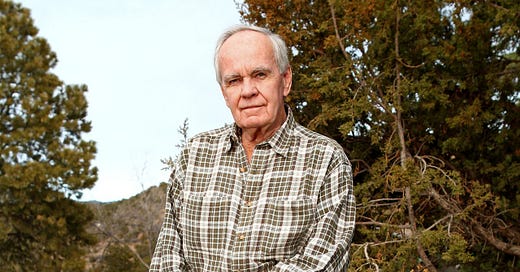Earlier this week, Cormac McCarthy passed away. Cormac was an American writer who is widely regarded as one of the greatest modern American writers, having authored 12 novels, two plays, five screenplays, and three short stories across the Western and postapocalyptic genres. He was known for his graphic depictions of violence (including scalpings, beheadings, arson, rape, incest, necrophilia, and cannibalism — and don’t even get me started on “baby trees” — PSA: don’t look it up if you like sleeping…), recognizable by a sparse use of punctuation and attribution (he was known for replacing commas with “and” to create polysyndetons). Some of his books include The Orchard Keeper, All the Pretty Horses, Blood Meridian, The Road, and No Country for Old Men (which was adapted into a film that won four Academy Awards, including Best Picture).
“Cormac McCarthy changed the course of literature…for sixty years, he demonstrated an unwavering dedication to his craft, and to exploring the infinite possibilities and power of the written word…millions of readers around the world embraced his characters, his mythic themes, and the intimate emotional truths he laid bare on every page, in brilliant novels that will remain both timely and timeless, for generations to come.”
Nihar Malaviya (CEO of Penguin Random House)
He’s a “colossally gifted writer” and “one of the great hams of merican prose, who delights in producing a histrionic rhetoric that brilliantly ventriloquizes the King James Bible, Shakespearean and Jacobean tragedy, Melville, Conrad, and Faulkner”
James Wood (literary critic)
“The true heir to Melville and Faulkner.”
Harold Bloom (literary critic)
Cormac rarely gave interviews, but spent much of his time at the Santa Fe Institute, which he discovered via his friend and Nobel Laureate Murray Gell-Man. He made SFI his second home, exchanging ideas with scientists and scholars and writing on his Olivetti manual typewriter. His last two novels, The Passenger and Stella Maris delved into the ideas of math, physics, and complexity, ideas he explored at SFI.
In fact, Cormac once revealed to Oprah (for his first television interview) that he did not know any other writers and much preferred the company of scientists. In fact, he spent so much time with scientists, and at SFI, that he wrote the institute’s Operating Principles in 2015.
Today’s letter is the document outlining the Santa Fe Institute’s Operating Principles.
Relevant Resources:
Santa Fe Institute
Letters
Compilations
Letter
Scientific work at SFI is always pushing creativity to its practical limits. We always court a high risk of failure. Above all we have more fun than should be legal.
We are absolutely relentless at hammering down the boundaries created by academic disciplines and by institutional boundaries structures. If you know more than anybody else about a subject we want to talk to you. We don’t care what the subject is.
We are beyond relentless in seeking out the best people in every discipline. We will get you here. No matter what. And we will give you the space and the resources that you need.
We don’t care how young you are.
We have in general avoided becoming involved in matters of policy. But if you are working on a program that involves sustainability or the environment or human welfare and you think we might have something you can use pick up the phone.
The educational opportunities that we offer—especially for young people—are simply not available elsewhere. Period.
Occasionally we find that an invited guest is insane. This generally cheers us all up. We know we’re on the right track.
Wrap-up
If you’ve got any thoughts, questions, or feedback, please drop me a line - I would love to chat! You can find me on twitter at @kevg1412 or my email at kevin@12mv2.com.
If you're a fan of business or technology in general, please check out some of my other projects!
Speedwell Research — Comprehensive research on great public companies including Copart, Constellation Software, Floor & Decor, Meta, RH, interesting new frameworks like the Consumer’s Hierarchy of Preferences (Part 1, Part 2, Part 3), and much more.
Cloud Valley — Easy to read, in-depth biographies that explore the defining moments, investments, and life decisions of investing, business, and tech legends like Dan Loeb, Bob Iger, Steve Jurvetson, and Cyan Banister.
DJY Research — Comprehensive research on publicly-traded Asian companies like Alibaba, Tencent, Nintendo, Sea Limited (FREE SAMPLE), Coupang (FREE SAMPLE), and more.
Compilations — “A national treasure — for every country.”
Memos — A selection of some of my favorite investor memos.
Bookshelves — Your favorite investors’/operators’ favorite books.



